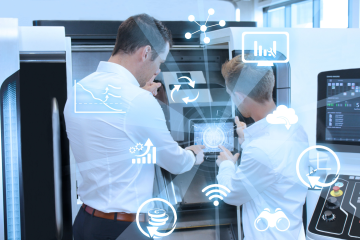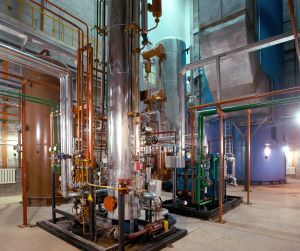Against the background of a globally increasing resource consumption, the Adaptive Remanufacturing approach in ReLIFE aims at increased resource efficiency by extending the life cycle of capital goods. Therefore, the usage of maintenance measures is optimized in technical, economic and ecological terms. The measures are controlled based on evaluations of sensor applications with the aim of maintaining a defined productivity level of the machine.

Resource-efficient life cycle extension
The research project ReLIFE aims at increasing resource efficiency by extending the life cycle of capital goods. Therefore, the innovative approach of Adaptive Remanufacturing is developed. It describes an adaptive maintenance strategy which determines the optimal time and scope of maintenance measures based on sensor technology evaluations under technical, economic and ecological aspects. In the course of ReLIFE, a prototype application is developed on an existinginvestment good. Furthermore, business models based on Adaptive Remanufacturing are developed enabling companies to generate competitive advantages. Thus, the prerequisites for the successful implementation of the approach in industry are created.

Innovation of adaptive remanufacturing
The innovative character of Adaptive Remanufacturing lies in the adaptability of the process in terms of time and content. Based on the sensor-monitored wear condition of components, preventive remanufacturing measures are proposed situation-specifically. The performance assurance of capital goods forms the basis for innovative business models to ensure long-term productivity. For example, wear parts such as filters or bearings can be monitored by sensors and maintained if necessary to maintain the agreed minimum performance level.
The research project is carried out within seven work packages. Remanufacturing approaches are developed on the basis of methodological and theoretical principles. In parallel, product design guidelines with a focus on integrated digital sensor technologies are developed and implemented within a physical demonstrator. Based on these guidelines, an evaluation model is designed and implemented in a software application to support decision-making regarding the optimized use of maintenance and remanufacturing measures. Simultaneously, remanufacturing-based business models are developed. The results obtained will be validated by means of the demonstrator.
Results (Status June 2022)
In the course of the project, remanufacturing and maintenance measures have been determined, aggregated in a catalogue and evaluated. Remanufacturing-relevant components of the demonstrator were identified on the basis of a detailed product structure analysis. A sensor concept was developed for these components and implemented within the demonstrator for the purpose of condition monitoring. For remanufacturing-relevant components, technically applicable measures were identified and narrowed down in a pre-selection. For each measure and component, economic key figures (in Euro) were determined on the basis of personnel costs, material costs and potential downtime costs. In addition, ecological key figures were determined in the form of CO2 equivalents within the framework of a life cycle assessment. Based on this preliminary work, the decision model was developed. In essence, the decision model generates a recommendation for determining the technically, economically and ecologically ideal measure in the first step. This is done on the basis of the findings on the ecological and economic expenditure, as well as the effective duration of individual measures. In the second step, the decision model generates recommendations for scheduling the implementation of measures based on real-time and historical sensor data as well as developed forecasting algorithms. The decision model was successfully implemented in a browser-based software application and connected to the demonstrator. The functional scope includes the selection and scheduling of suitable measures in addition to visual condition monitoring.
In parallel, three product-service-system-oriented business models were developed for the concept of Adaptive Remanufacturing. These three business models differ particularly in the ownership and responsibility structure for the capital good as well as the value creation architecture in the context of the software application in addition to the physical capital good. The analysis of strengths, weaknesses, opportunities and threats led to an assessment of the applicability of the three business models. Particularly in the case of the use-oriented and results-oriented business model, the financial risk is predominant due to long-term payments, which is why the focus of the project was set on the classic product-oriented model.
In the further course of the project, the business model as well as the user-friendliness and potential of the software application are to be validated.
Another success of ReLIFE is the participation in the 29th CIRP LCE Conference on Life Cycle Engineering with two publications on the project results.
Consortium from research and industry
The results are jointly developed by the consortium partners. The Laboratory for Machine Tools and Production Engineering (WZL) of the RWTH Aachen University is the consortium leader and mainly responsible for the development of remanufacturing measures and the decision model for the application of these measures. The Chair of International Production Engineering and Management (IPEM) of the University of Siegen focuses on the development of remanufacturing-based business models. Achenbach Buschhütten GmbH & Co. KG is significantly involved in the construction of the demonstrator with integrated sensor technology.
The results of the project can be utilized within research as well as by national, international and in particular small and medium-sized companies in order to raise economic potentials through the proactive life cycle optimization of capital goods.
Publications
Project flyer of the funding measure (German / English) (March 2021)
The project flyers offer an insight into the contents and goals of the ReziProK projects and present first results in each case.
Project sheets of the funding measure (German) (August 2019)
The project sheets provide a brief overview of the individual projects and their goals.
Contributions to the ReziProK Transfer Conference in June 2022
Poster (German) (June 2022)
Presentation (German) (June 2022)
Contributions to the ReziProK Kick-off event in December 2019
Poster - in German (December 2019)
Presentation - in German (December 2019)
Picture credits: WZL
